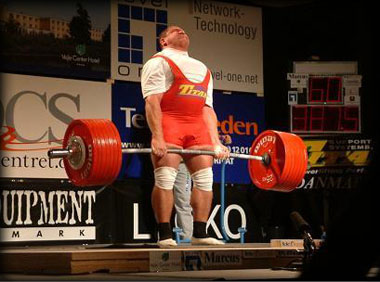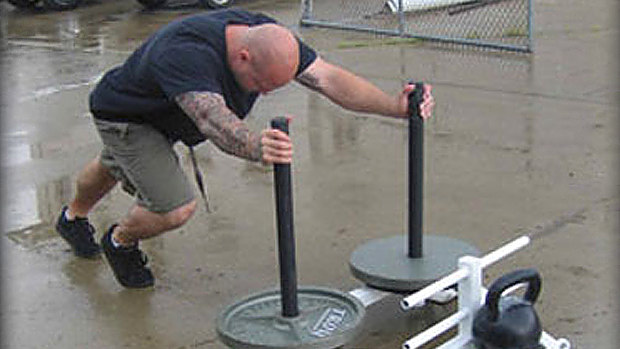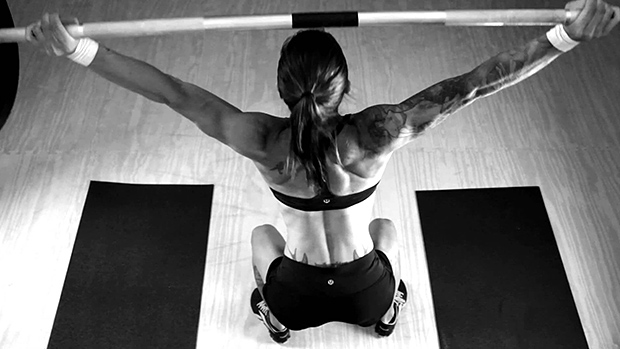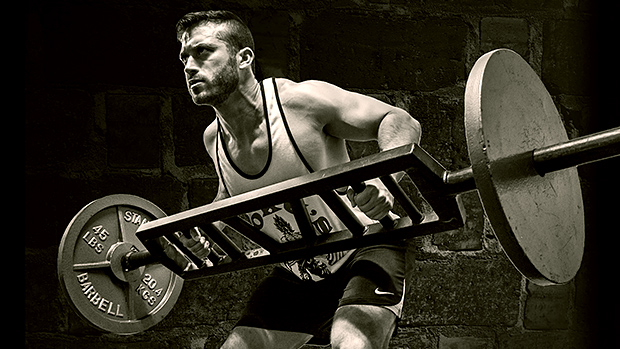Lately I am absolutely dominating the rack pull. I started doing them after my conventional deadlifts (which I perform 5/3/1 style) and the weight I can handle has been skyrocketing. The thing is, my conventional dead seems to have stalled. What gives?
This is a classic case of an idea that works beautifully in theory but, at least in your case, fails to pay off in the real world.
The theory behind rack pulls is that they allow you to use more weight than you normally can handle in conventional deadlifts, which helps target certain sticking points, namely the lockout position—a real sore spot for many lifters. Sounds good, huh? Like I said, it's a swell theory.
The problem is, I'm not sure how effective this is for most people. I've seen (and experienced) many extreme rack pulls that rarely carry over to the actual deadlift. Personally, I've actually pulled over 900lbs from a rack and could barely lock out 700 in the full range deadlift.
Now, perhaps this 900lb rack pull allowed me to lock out the 700, but I have a seriously hard time believing that.
I think part of the problem is how rack pulls are performed in training. Most of the time these are done for sets of 1, working up to a 1RM. That's fine and dandy if you want to test your rack pull and see where you're at. But all that does is test you, not build you: if training to a 1RM was all you needed to get stronger, then all you'd have to do is enter a meet each week and max!
Question: How many times have you seen a lifter hit the weight room and work up to a max single on the bench press? And do this every single workout? And where is this person a year from now?
Answer: He's the same. Or he's hurt, or overtrained, or worst of all, he's sitting at home arguing on the Internet about strength training.
The rack pull needs to be treated in the same way as we treat other assistance work, but with an added caution: there's a difference between rack pulls and back extensions, and doing multiple sets of 10-20 reps of back extensions isn't nearly as stressful as doing the same thing with rack pulls.
Having said that, perhaps doing repetitions on some of the popular 1RM exercises like rack pulls will help develop and strengthen the areas that they're designed to help. Doing some sets of 5-10 reps certainly won't hurt you, and will probably develop some much-needed muscle mass.
But these need to be programmed into your training with caution, son. So let's say you're running my 5/3/1 program and wish to add rack pulls into the training. Because it's a bigger assistance exercise, we can easily account for it with some minor changes:
Deadlift: 65% x 5, 75% x 5, 85% x 5 (don't go for max reps on the final set)
Rack Deadlifts: 4 x 6-8 reps at 80% of rack dead max
Glute Ham Raises: 3 sets of 10
Ab Wheel: 3 sets of 20
As for setup: where the bar is positioned during the rack pull is largely going to be determined by your power rack. Racks with large spaces between holes obviously limit you, although you can put the bar in the rack and adjust the height of your feet with mats or plates. Truth is though, that's a major pain in the ass, so just pick a setting below your knees and tug away.
Notice I said BELOW the knees. I'm not a fan of very high rack pulls (above the knees) namely because, a) it ends up being yet another faggity ego contest, b) the bar bends and ends up being an even shorter rack pull and, c) the body position during the rack pull is vastly different than when used during the full range deadlift. In other words, try to find a position below your knees.
The most important thing to remember is this: The rack pull is not the end itself, but a means to an end. Don't be one of those guys that plays for Team Rack Pull and shits the bed when it comes time to pull from the floor. No one cares what you can tug from pin #9 (with straps); we care what you do from the floor with just a belt.

I always get a kick out of reading about Dave Tate's laundry list of injuries. The fact that he can be so beat up and still kick so much ass is inspiring. Lately, I've been dealing with a shoulder impingement and a lower back that gives out about once every four weeks. What advice do you have regarding training around injuries?
Your back gives out monthly? Have you considered switching from oral contraception to an IUD?
Sorry, not trying to call you a pussy or anything (okay, I am), it's just that your injury list sounds like a typical powerlifter on a GREAT day. If you're looking for sympathy from me, you're going to be seriously disappointed.
Here's the deal: there's a difference between being hurt and being injured. You sound like you're injured. Boo hoo. I'm injured too, but I wish I had your monthly menstrual-like injury problems: I have a shoulder that's so messed up it hurts to even think about jerking off, and as of yesterday, a gimp hamstring. So I'm limping around with a dead arm to boot; I feel like I've been playing football again.
Now it's easy for you and me to sit around and feel sorry for ourselves; it seems that this is very common amongst people of the world. But since I live and breathe training, I can't imagine sitting on my ass for months and just wait for it to get better. Nope. And I'm not going to resort to some pussy workouts, either. I may be injured, but I'm not hurt.
So what's a man to do? Grow a proper set of nuts and train what is trainable. I learned this from the nomadic strength coach, Buddy Morris (now at the University of Pittsburgh) and it's stuck with me to this day. So instead of completely ignoring my upper body (or now, my lower body), I put myself through some tests to see what I possibly COULD do. This allowed me to focus on something positive, as opposed to the usual pissing and moaning.
So with my ridiculously screwed shoulder, I can do the following:
- Chin Ups/Pull Ups
- Rows (of various types)
- Alternating DB upright rows (barbells and cables seem to hurt, but this variation is completely pain free)
- Triceps Pushdowns
Now my hamstring injury is relatively new so I'm not sure what my limits are, but I'll test them out today. I know I can't deadlift or clean (and barbell rows might be out), but I can do bodyweight squats with no pain, so that might be in the cards for me.
I won't be able to run hills, but I can walk, so weighted vest work is not out of the question. I'm not sure about the Prowler, but who knows? I'll test it out. I might be able to walk up and down steps with the weighted vest for conditioning work, and I'll likely be able to do leg extensions, too. Of course, ab work is always an option. I may be injured, but I'm not hurt.
Whatever the case, you have to find and experiment with exercises that you CAN do without aggravating the existing injury, and then do them with the same intensity and balls that you approach the "big ones" with. In other words, you have to keep the motivation and the importance in the training. Being injured is not an excuse to trade in your training log for a sweater vest and a walker. There are guys training in the gym who are missing limbs or don't have the use of their legs; what the hell was your excuse again? Your shoulder bothers you?
I'm still a realist and believe in resting injuries until they're healed; there's no point to beating a worn out joint or muscle. But I'm not a fan of sitting on the sidelines and falling victim to the usual woe-is-me trap of self-pity, ice cream, and reruns of House (how bad has that show become over the years?).
So learn the difference between injured and hurt. If you have something that's injured, train what's trainable. Attack it with the same attitude and mentality as you would a squat workout.
Let me rephrase that: Attack it with the same attitude and mentality as you should attack a squat workout.
Jim, when going for an all-time record, should I have perfect form? Does it make a difference if I'm going for an actual 1RM or a 5RM?
No, not unless you're wearing equipment (bench shirt, suit/briefs).
I've talked about this quite a bit and have asked a lot of different people the same question; if you're doing a rep max, whether it be for 10 reps or 1 rep, things might end up getting a little ugly. Now this doesn't give you license to lift with poor form or to forget about some simple technique cues that are essential, but please don't think that things are going to be picture-perfect throughout the set.
For example, if you're going for a true 5RM, there's a good chance your fifth rep is going to be a little rough and might not be perfect. That's what it takes to dig down and muscle some weights up.
Now I can already hear the histrionic wailings of the Weak Point Brigade that will challenge me on this point, so let me be clear: I think good form is a great idea. But these are the same people who will tell you to arch your lower back when you deadlift, which is great advice when you're showing your 60-something year-old mom how to pick up a potted plant; the reality is that no one that pulls big weights with a conventional stance has a perfect low back arch. So I'm not sure what they're selling you, but I can assure you that you if you left it out in the sun for a few hours you could fertilize the lawn with it.
I just see too many people that ask me (and many others on forums) to evaluate their form during a rep max. This is like evaluating my critical thinking process when I've got Sniffer's Row seats at the Canadian "Ballet." There's a time and place for everything, and during a rep max of any kind is not it.
The problem with this kind of technique micromanagement is that people wind up getting too scared to go up against a big weight for fear that their form might not be textbook perfect and then, when they come up on their toes a bit or their head dips down, the Weak Point Brigade emerges and starts evaluating, nit picking, and worst of all, offering advice.
So in conclusion, lift like Conan: lift for Crom. Crush your limitations, see them driven before you, and hear the lamentation of the Weak Point Brigade!
Jim, some days I freaking hate training. I hate talking about it, thinking about it, and more than anything I hate arguing about it. Can you relate?
I've been on a mission the last few years to get back to the roots of training; to get back to when training was fun, simple, and most importantly, free of the fluff and crap that has polluted MY WORLD.
When training was about strength, about moving weight, and moving bodies. About being proud of an added rep or 10 more pounds. Where performance and kicking ass are more important than how you look. Where people eat to live, not live to eat. Where trucks are pushed and sleds are pulled. Where reps and weight are counted, calories are not. Where running isn't "cardio, it's part of training and if you're going to walk for your conditioning you best have something on your back or in your hands.
With that in mind, here's a list of some simple rules that we follow:
- Squats are walked out.
- Lift-offs are not given on the bench press.
- If you're going to overhead press, it will be done standing.
- No straps unless you are hurt or doing a hang variation of a lift.
- You don't debate about organic/non-organic, or about milk.
- Squats are done with a barbell on your back; this is assumed and are not called "Back Squats." You don't say you're gong to take a "standing piss" do you?
- No need for music or training partners or "the right atmosphere" to train hard.
- There are no 8-week plans, rather yearlong goals and decade long achievements.
- All you need is a rack, barbell, platform and some weights.
- You realize stretching doesn't make you slow or non-explosive.
- You realize physical strength can develop mental and spiritual strength.
- You never fall for gimmicks; principles last forever.
Now there are quite a few more of these, but you get the picture. The point is this: training has become over run with people telling US how we need to think, how we need to train, and what is acceptable. That is like me telling Fenriz what black metal is: I don't get to decide it, he does.
So in sticking with the reference, there are two kinds of "hardcore" people out there. There are Metallica people and Darkthrone people. Metallica people are fine, but don't come into my Darkthrone world and tell me what is Raw or what is strong or how I need to eat. Don't bring your gimmicky elements onto my platform. And please, don't try to sell us on how hardcore you are or how dedicated to strength you are. Your lifts and your silence do more talking than your Internet chatter and bravado.
Here's a real-world example: Not long after my last meet, I was hit with some criticism over some things that were absolutely ridiculous. I was informed of this several days later from a friend of mine and was stunned. Then I realized that in the last few days since the meet was over, I had traveled over 2000 miles with my son, lifted twice, and ran 50 hills.
So you can choose — do you side with Metallica or are you Darkthrone?



